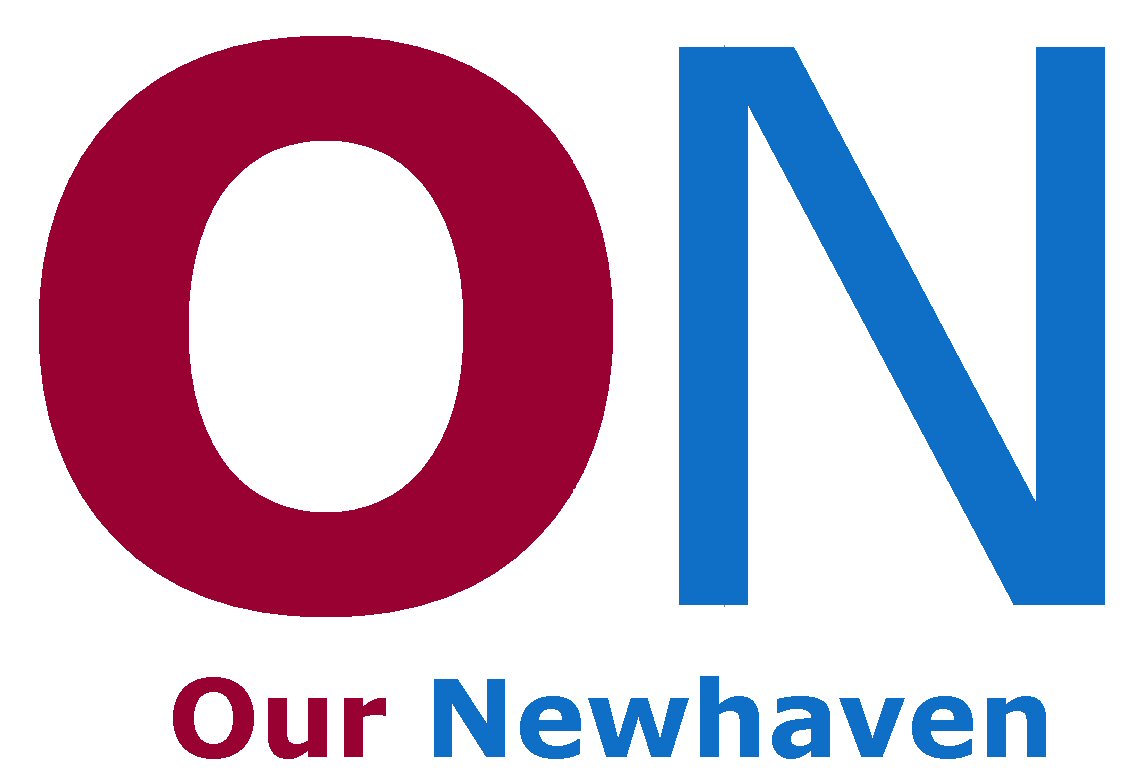About Me and My Teaching
I’ve been a musician for over 51 years, as well as being a full time music teacher for over 30 years. That experience, plus my own passion for music, means I firmly believe that music making should be fun - and that’s fun with a very big capital F. Even if you’re really serious about your music, perhaps to the extent of considering it as your future career, it should definitely still be fun. If it isn’t fun when you’re playing, there’s something wrong somewhere that needs to be addressed, and if you’re not having fun when you’re learning, your teacher needs to know - immediately! I try to make sure that all my teaching is carried out with this in mind. Boring, stodgy lessons are definitely out and, whilst of course teaching remains the number one priority, many a lesson has erupted into fits of laughter at some point! As one young student once told me, I’m not like her previous ‘old fashioned’ teacher.
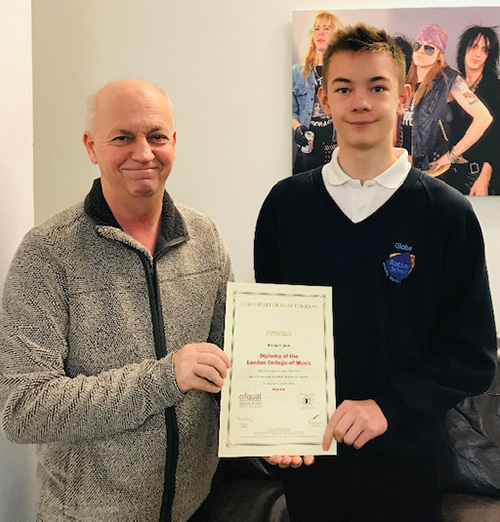
Presenting one of my young Diploma standard students with his DipLCM Certificate.
I teach piano, in classical and modern styles, electronic organ, electronic keyboard, music theory and music technology. Given my background in the industry and my work with some of the very first keyboards to come onto the market, it’s perhaps not surprising that I’ve become something of a specialist in electronic keyboard teaching, I’m not just a piano teacher who either ‘dabbles’ with it or reluctantly tolerates it. A modern electronic keyboard can be an amazing instrument if it’s played and taught properly and I am one of the few teachers who will take keyboard students up to Grade 8 or even Diploma level! Music technology includes basic synthesis techniques, recording methods and many aspects of computer music making. I specialise in using Cubase and Sibelius software and can help you set up a basic home studio based around these packages. Many of my more advanced keyboard students will also be studying some music technology, linking their instruments to their computers to produce stunning multi-track performances and high quality printed scores.
All my instrumental teaching is properly structured, with aspects of theory, aural work and sight-reading routinely built into the learning process of new pieces of music, rather than being left until later - or perhaps never being covered at all! If you want to take exams you can, but they’re never compulsory, as I believe that they should always be milestones, not millstones! I also flatly refuse to go in for what I term ‘certificate chasing’, where a student does nothing but take exams, one after the other. (I’ve occasionally taken on new students whose entire experience of a given grade has turned out to be just the three exam pieces and scales!) I use the syllabuses of both the Associated Board and the London College of Music for piano and theory, and London College of Music exclusively for keyboard. If you do choose to take exams, then you can rest assured that I’ll be supporting you all the way, and you’ll be pleased to know that my students have a 100% success rate, with more than 90% of them passing with Merit or Distinction. Marks above 90% are by no means rare and my ‘student high scores’ are currently 99% in both theory and practical exams - the students didn’t know whether to be delighted with their scores or mad with themselves for missing that last mark! Even at the highest grades, marks have often been in the high 90s with examiners commenting on 'professional standard' performances. And I have a small but growing group of youngsters who have achieved Diploma status before leaving school. The letters that they are now entitled to use after their names are fully accredited and will stay with them for life!
If you wish to enter local competitions or festivals, then I'll back you 100% in your preparations. At the 2019 Hastings Festival, my students won every class that they entered, with two of them being invited back to take part in the Festival's Finale Concert as 'highest marks winners', and picking up special awards. One young lad went back to the Festival in 2020 and won the Gold Medal to go with his Silver Medal from the previous year, and retained the prestigious Tony Back Trophy after receiving the highest mark ever awarded in an Electronic Keyboard class.
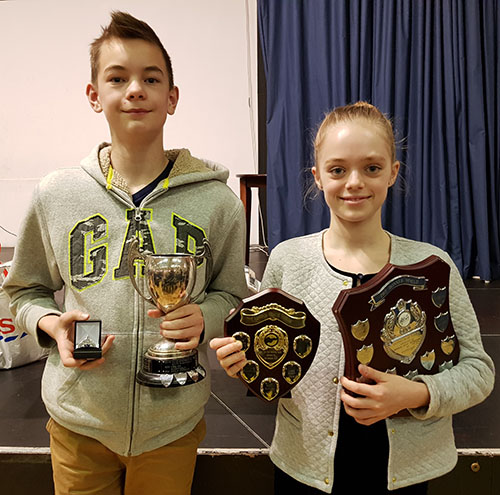
Two of my Hastings Festival Winners with their multiple trophies.
With me, there’s a big emphasis on musical performance, as merely playing the notes in the correct order doesn’t really make the music come alive. Piano players will learn the art of ‘reading between the lines’ of what is written, interpreting the piece their way, and putting their own ‘stamp’ on a piece. Contrary to what you might think, playing a piece ‘as written’ for a piano exam does allow for some stylistic interpretation - and it’s often rewarding to ‘bend’ a piece just a little more than that, purely for fun! Keyboard and organ players will go further still, learning the arts of orchestration and arranging, and they’ll be using everything that their instrument has to offer. All of this will come in handy for exams, competitions and concerts, as well as playing in front of Mum, Dad, relatives, friends etc!
Whatever you want to learn, you’ll find that there are almost no age barriers as far as I’m concerned. I have had students as young as 5 learning piano and keyboard and many have stayed with me until they have gone to college or university, having gone right the way through the grades. At the other extreme, I have had many, many 'senior' students including some in their 80s playing organ, keyboard and piano - and quite a few of them have passed high level exams with flying colours! Whatever their age, I make sure that all of them are getting a lot of enjoyment as they learn.
I’m based in Newhaven in East Sussex and would normally teach in the coastal area between Brighton and Eastbourne, and as far inland as Lewes, Ringmer, Hassocks, Ditchling and Hailsham. If you live further away and are interested in a whole morning's tuition on a regular or semi-regular basis, or even a one-off whole day to give you a real, in depth introduction to a new instrument, perhaps, then that can be arranged.
However, COVID 19 put a stop to home lessons and I have switched to one to one lessons on line, using Skype or Zoom. I have all the necessary equipment set up in my home teaching studio, so all you need is your instrument and a smartphone, tablet or laptop. I can advise you on how to set up Skype and Zoom so I hear the best possible audio quality from you. My on line students tell me that they really enjoy their lessons and a few have taken the new, fully accredited, on line exams, passing with marks in the high 90s!
As restrictions are eased I will start up face to face lessons for those who want them, keeping in line with any Government guidelines applicable at the time. However, so far, most students have decided to stay on line. The choice will always be that of the student.
I've been asked if I can do on line lessons covering things like how to make the best use of a given instrument, or how to take a basic version of a tune, as found in many a keyboard or organ book, and arranging it into something a bit longer and rather more musical. I'm more than happy to do this and the instrument being played makes no difference.
Of course, teaching on line means that there are no geographical restrictions and I can now welcome students from all over the UK and abroad - even if time zone differences do result in some slightly unusual lesson times!
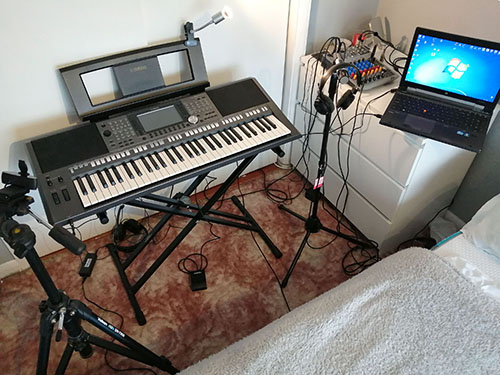
My On Line Teaching Studio set-up for piano and Keyboard
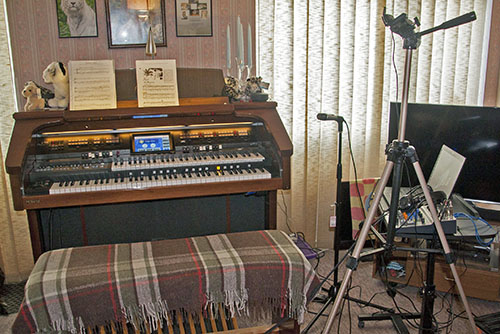
My On Line Teaching Studio set-up for organ
For more details, please contact me by phone on 01273 516517, phone or text me on my mobile 07754 839104, send me a Message on my Facebook page or send me an e-mail
